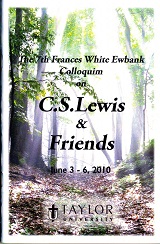Event Title
Session 1-A
Location
Taylor University, Rupp 205
Start Date
3-6-2010 3:45 PM
Description
"What Art is For: Christianity and Culture from Lewis's Perspective" - Charlie Starr
Contemporary Christian culture does not know what art is for. C.S. Lewis did. First of all, he understood that Christians should not try to change culture by turning art into propaganda. The first purpose of art is not to be didactic but to be beautiful and provide pleasure and play. It may have secondary purposes - to inspire, to draw us to God - but art cannot achieve these purposes without achieving the first. Secondly, Lewis knew that we should not simply analyze art for its philosophical underpinnings. Though Lewis recognized the need for worldview analysis, this approach devalues play and reduces artistic meanings to mere philosophical statements. But meanings in artistic texts should be received with the imagination as well as the reasoning intellect. Lewis believed in the importance of receiving artistic texts rather than using them, and of perceiving them as representing two distinct communications: logos and poiema. Finally, and with marked contrast, through Lewis was against using art for propaganda, he nevertheless saw its value for moral instruction and inspiration. His ideas on the moral imagination are key to understanding moral truth and motivating moral behavior.
"Learning in the Shadowland: The Educational Vision of C.S. Lewis" - Brian Hudson
C.S. Lewis is considered by many as one of the great thinkers and apologists of the twentieth century. His writings have touched and encouraged millions of individuals over the last seven decades. Lewis’s writings cover a wide range of topics but at his core he was a teacher. Even in his children’s literature, readers can clearly perceive that Lewis was always concerned with human growth and flourishing. He was concerned with how people learn and what inspires them to pursue a clear knowledge of God in the world they live. Today’s culture is marked with a loss of true education. Each generation becomes less connected with its history and is steadily sliding into moral bankruptcy. As readers reflect upon the writings of C.S. Lewis, one is struck by his vision of what it means to be a true learner, as well as his clear perspective on what education is meant to be. It is Lewis’s vision of learning and the nature of the learner that offers one of the best critiques to the modern educational culture, as well as, one of the clearest paths to developing a strong philosophy of learning.
"Grief Observed: Pain and Suffering in the Writings of C.S. Lewis and Frederick Buechner" - Victoria Allen
C.S. Lewis (1898-1963) and Frederick Buechner (b.1926) never actually met, but they can be considered kindred spirits because as 20th-century authors writing from a Christian perspective, their writings and spiritual journeys have much in common. Both writers are known for their literary expressions of faith, whether through creative fiction, non-fiction, apologetics, literary criticism, or sermons. Both writers are known for their vivid imaginations, humor and phenomenal ability to put into words the truths of spiritual experience. And both have experienced grief and brokenness which they have expressed in their writings.
How they tell their stories reflects their views of themselves and God. As a scholar, Lewis writes a philosophical treatise, The Problem of Pain, then twenty years later reveals his personal experience in his private journal published under a pseudonym as A Grief Observed. Beuchner reveals the depth of his struggles through the trials of a 12th century saint by writing Godric and his third memoir Telling Secrets. Their expressions of pain and brokenness powerfully portray the paradox of Christian suffering.
Moderator: Pam Jordan-Long
Event Type
Paper
Session 1-A
Taylor University, Rupp 205
"What Art is For: Christianity and Culture from Lewis's Perspective" - Charlie Starr
Contemporary Christian culture does not know what art is for. C.S. Lewis did. First of all, he understood that Christians should not try to change culture by turning art into propaganda. The first purpose of art is not to be didactic but to be beautiful and provide pleasure and play. It may have secondary purposes - to inspire, to draw us to God - but art cannot achieve these purposes without achieving the first. Secondly, Lewis knew that we should not simply analyze art for its philosophical underpinnings. Though Lewis recognized the need for worldview analysis, this approach devalues play and reduces artistic meanings to mere philosophical statements. But meanings in artistic texts should be received with the imagination as well as the reasoning intellect. Lewis believed in the importance of receiving artistic texts rather than using them, and of perceiving them as representing two distinct communications: logos and poiema. Finally, and with marked contrast, through Lewis was against using art for propaganda, he nevertheless saw its value for moral instruction and inspiration. His ideas on the moral imagination are key to understanding moral truth and motivating moral behavior.
"Learning in the Shadowland: The Educational Vision of C.S. Lewis" - Brian Hudson
C.S. Lewis is considered by many as one of the great thinkers and apologists of the twentieth century. His writings have touched and encouraged millions of individuals over the last seven decades. Lewis’s writings cover a wide range of topics but at his core he was a teacher. Even in his children’s literature, readers can clearly perceive that Lewis was always concerned with human growth and flourishing. He was concerned with how people learn and what inspires them to pursue a clear knowledge of God in the world they live. Today’s culture is marked with a loss of true education. Each generation becomes less connected with its history and is steadily sliding into moral bankruptcy. As readers reflect upon the writings of C.S. Lewis, one is struck by his vision of what it means to be a true learner, as well as his clear perspective on what education is meant to be. It is Lewis’s vision of learning and the nature of the learner that offers one of the best critiques to the modern educational culture, as well as, one of the clearest paths to developing a strong philosophy of learning.
"Grief Observed: Pain and Suffering in the Writings of C.S. Lewis and Frederick Buechner" - Victoria Allen
C.S. Lewis (1898-1963) and Frederick Buechner (b.1926) never actually met, but they can be considered kindred spirits because as 20th-century authors writing from a Christian perspective, their writings and spiritual journeys have much in common. Both writers are known for their literary expressions of faith, whether through creative fiction, non-fiction, apologetics, literary criticism, or sermons. Both writers are known for their vivid imaginations, humor and phenomenal ability to put into words the truths of spiritual experience. And both have experienced grief and brokenness which they have expressed in their writings.
How they tell their stories reflects their views of themselves and God. As a scholar, Lewis writes a philosophical treatise, The Problem of Pain, then twenty years later reveals his personal experience in his private journal published under a pseudonym as A Grief Observed. Beuchner reveals the depth of his struggles through the trials of a 12th century saint by writing Godric and his third memoir Telling Secrets. Their expressions of pain and brokenness powerfully portray the paradox of Christian suffering.
Moderator: Pam Jordan-Long


